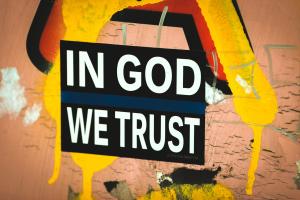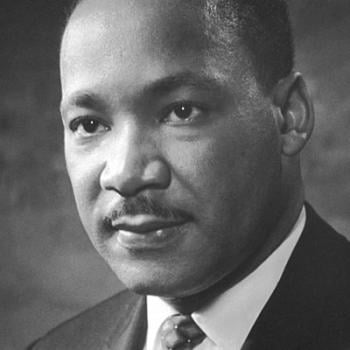
No cliche is more common in moderate and progressive circles in our culture than the claim that “religion and politics shouldn’t mix.” Around election time, this often takes the form of claims that politicians oughtn’t to let their religious views influence their political actions. Anyone who disagrees with this is taken to be a right-wing extremist. The United States is, allegedly, in danger from a conspiracy of dangerous theocrats who want to impose their religion on everyone. The only answer is to defend a strict interpretation of the “wall of separation” between church and state.
I disagree with nearly every part of that. The one part I agree with is that there is a dangerous right-wing movement in America fueled by a particularly toxic interpretation of Christianity. But I don’t think most people in this movement can fairly be described as “theocrats.” I don’t think the problem with American conservatism is “too much influence from Christianity.” I think it’s actually a violation of religious freedom to expect politicians to leave their faith behind when they act in an official capacity. And I don’t think that the separation of religion from politics is possible, much less desirable.
What is religion, anyway?
To unpack this we have to be clear on what we mean by religion, which is actually a much more difficult concept to define than many people realize. I think there are at least three relevant possible meanings:
1. One’s most basic convictions about the nature of the universe, of the human person, of the meaning of life, of a just society, and so on.
2. The major traditions we commonly call “religions” which embody the fruit of centuries of thought and experience regarding these “big questions.”
3. Specifically supernatural beliefs about God or some other source of transcendent truth and meaning who has allegedly given us special knowledge not otherwise accessible.
I put 3 after 2 for two reasons. First because at least one major world religion, Buddhism, does not really depend on claims of divine revelation, though of course the concept of enlightenment is a kind of revelation and there certainly are plenty of supernatural elements to traditional Buddhism. But in the second place, even traditions such as Christianity and Islam which more clearly depend on claims about theistic revelation have a large place for the use of reason in determining truth.
The idea that Christians or Muslims or adherents of any other religion just blindly accept what some divine being has supposedly revealed and follow these instructions literally does not match the reality of any major religion I know. The more “fundamentalist” segments of those religions may claim that it works like this, but under critical examination those claims about their own behavior tend to fall apart. (An obvious example would be the flimsy arguments conservative Protestants make to try to ground their opposition to abortion in Scripture.) Claims about revelation tend to be plausible to people because they fit their experience of reality, even as beliefs in divine revelation in turn shape that experience. It’s a feedback loop, not a straightforward dependence on some supposedly certain revelation.
Religion all the way down
If we define “religion” in that first, broadest sense, then clearly we can’t and shouldn’t separate religion from politics. To separate one’s deepest convictions about truth and goodness and justice from one’s politics is, by definition, to make politics cynical and amoral. All that is left, at that point, is advocating for one’s own interest or that of one’s own group. Appealing to a supposed secular conception of “fairness” or “reasonableness” doesn’t solve this problem, it seems to me, because such a conception is itself rooted in some ultimate belief that seems so obvious to most people in a given culture that it is taken for granted.
Perhaps the word “religion” isn’t the best one here. Apparently John Rawls used the term “comprehensive doctrine” and that will work as well as any. (It’s not clear to me that Rawls managed to avoid simply imposing one comprehensive doctrine under the name of a “public reason” that transcended all comprehensive doctrines. But I have not read Rawls for myself and perhaps will change my mind after doing so.)
I argue then (against Rawls as I understand him) that there is no getting behind or beyond “comprehensive doctrines.” But I agree with him (if I understand his ideas correctly) that a stable society requires an “overlapping consensus” in which all the major “comprehensive doctrines” agree enough to form the basis for laws generally accepted as just.
One of the reasons why denunciations of politicians for being “too religious” don’t work is that such denunciations will have no effect on their intended targets. All they do is motivate people to organize to oppose the supposed “theocrats.” But that just provokes the “theocrats” to fight back more fiercely because as they see it, their freedom to practice and advocate for their own conceptions of justice and virtue is being threatened. If we want to have an “overlapping consensus” then we have to take into account even those groups whose beliefs may seem unreasonable to us, and try to find common ground.
Religions as cultural systems
What then of those specific “comprehensive doctrines” which we customarily call “religions”? One of the most influential ways of speaking about religions, among scholars of the subject, is Clifford Geertz’ concept of a “cultural system.” Geertz (1965) defines a religion as
(1) a system of symbols which acts to (2) establish powerful, persuasive, and long-lasting moods and motivations in men [sic] by (3) formulating conceptions of a general order of existence and (4) clothing these conceptions with such an order of factuality that (5) the moods and motivations seem uniquely realistic.
Geertz’ language of “moods and motivations” is especially relevant to the question at hand. To be a committed Christian or Muslim is to have a set of “moods and motivations” that shape one’s actions and are in turn shaped by the “system of symbols” to which one adheres. Religion doesn’t simply dictate specific beliefs–it shapes the kind of people we are, what our deepest motivations are, what things we find important, what things we find appealing or repellent.
Furthermore, to be a Christian or Muslim in a “liberal democratic” society is to live in at least two different “cultural systems” at once. (I’m focusing on those two religions because they are the most likely to be seen as a threat by secular people.) In Geertz’ sense of the term, democracy is arguably itself a “religion.” It certainly is a system of symbols and it establishes powerful moods and motivations which come to seem “uniquely realistic.” People who find their primary religion to be at odds with the moods and motivations of liberal democracy will either withdraw from politics or will seek to undermine liberal democracy. Only in this last case does a religion become a direct threat to liberal democracy.
The disposition to undermine liberal democracy is historically found more among Catholics than among Protestants and at the present time probably more among Muslims than among Christians, but it seems to be a small minority in all major religious traditions within the United States. Actual “theocrats” in the sense of people who want to overturn the institutions of American democracy are a tiny minority within the so-called “Christian Right.” Actual adherents of the Christian Right overwhelmingly see themselves as the defenders of historic American political institutions against what they see as a totalitarian “Left.”
Rather, what is happening most of the time is that Christians (let’s focus on Christians because they are, after all, overwhelmingly the largest religious group in America as well as the group I myself belong to) are arguing for policies that seem good and just to them based on the “moods and motivations” fostered by their particular version of Christianity. When those policies seem bad to other people–whether non-Christians or Christians of a different flavor–those other people are prone to see such arguments as “theocratic.” Practically nobody ever objects to religious people whose religion motivates them to argue for politics that line up with the one’s own “moods and motivations.”
So, for instance, progressives criticize Catholics who oppose abortion because this is allegedly imposing Catholicism on the country. But you don’t find progressives criticizing Catholic politicians who cite their religion as a reason why they support universal health care or other policies designed to protect the poor and vulnerable in ways progressives agree with.
To suggest, seriously, that people can’t be motivated by their religion’s “cultural system” in their public actions is a form of anti-religious discrimination. It is to privilege certain cultural systems over others unfairly.
One of the most discouraging things that happens when I get into this discussion on Facebook is that people will ask, with evident confidence that they have “got me,” whether I’d be OK with a Muslim being motivated by their faith in their public actions. To which I respond: “what sort of anti-Muslim bigot do you take me for?”
Revelation vs. natural law
It’s only when we get to that third sense of “religion,” specific claims rooted in alleged divine revelation, that we have a case for telling politicians they can’t be motivated by religion in public life. And even there, the influence would need to be direct. So, for instance, it’s obviously inappropriate for someone to say that abortion should be illegal because the Bible says so. (That the Bible doesn’t clearly say so, and that the Hebrew Scriptures can plausibly be interpreted in ways that support the pro-choice position, is of course a relevant point, but the fact remains that many people think the Bible says so and some of them are willing to cite that as a reason why other people should be prevented from having abortions.) Or (much more plausibly) for a Catholic to say that abortion should be illegal because the Church says so.
I disagree with what I understand of Rawls’ concept of how “public reason” works, but the concept of “public reason” is itself a helpful one I think. It is fundamentally akin to the internal Catholic conception of natural law as distinct from revelation. But as any progressive who has argued about natural law with a conservative Catholic will quickly recognize, “natural law” itself isn’t as non-sectarian as some of its proponents claim.
This is where we get back to the second point and the “moods and motivations” of a particular religion. Religions are comprehensive systems which shape how people reason. Someone shaped by the symbols and beliefs and “moods” of Catholicism will reason differently than someone shaped by materialistic atheism or liberal Protestantism or Judaism or Islam or Buddhism. And many of us are shaped by multiple interlocking “cultural systems.”
So as a Catholic, I think it improper to argue for imposing laws on other residents of the United States that are based on specific claims of revelation proper to Catholicism or to Christianity as a whole. But I do not think it improper to argue for laws that my religion leads me to think are just and serve the common good and human flourishing. I do not think that my views on human personhood, say, should be treated as less valuable than those of Peter Singer because he is an atheist and I am a Catholic.
Peter Singer or the Jains?
Here’s a final thought experiment to clarify my point, since I’ve brought up Singer. Suppose a possible future in which the killing and eating of animals is made illegal because enough Americans have come to believe that animals have an inherent right not to be killed just as humans do.
Some people might support this policy because they agree with the secular utilitarian ethic of Singer. Others might do so because their religion led them to believe that animals have souls just as humans do and that humans may in fact be reincarnated as animals. (Suppose, for instance, that there was a massive surge of Jainism–an unlikely but intriguing possibility.) But both groups would agree that the killing of animals was morally wrong.
Would it be reasonable to claim that only the secular utilitarians “got” to advocate against the killing of animals? Would it be more tyrannical to be told that one couldn’t eat meat because a consensus had developed that animals had souls than to be told that one couldn’t eat meat because the concept of souls had been rejected and animals met a scientifically determined threshold for sentience?
In both cases, many people would be expected to follow laws determined by a set of beliefs they didn’t share. In both cases, the legitimate question to ask would be whether there was a sufficient consensus in the society on the immorality of killing animals to justify interfering with some people’s agricultural and dietary practices. But the “religious” or “secular” basis for that consensus would be, I argue, entirely irrelevant.











